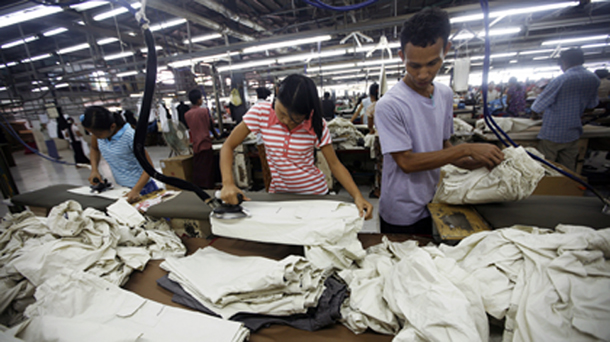European Union Ambassador encouraged EU companies to consider on investing in Myanmar even as trade sanctions loom
11 Jun 2019
YANGON—EU Ambassador Kristian Schmidt has encouraged European companies to consider investing in Myanmar, saying its “potential for further growth is very significant” as garment exports to the EU have already overtaken those of Sri Lanka, Thailand and Tunisia.
“I would like to see more European companies investing all over Myanmar, in the different states and regions,” the ambassador said, addressing more than 500 business leaders and policymakers from Europe and Myanmar at the Myanmar-EU Economic Forum in Naypyitaw on Thursday.
To attract more investment, however, he said that the government needs to urgently address some burning human rights issues and the damage to Myanmar’s “corporate brand” caused by the crisis in Rakhine State.
“You can do it, and the international community is happy to help,” he said.
Despite being the biggest investor in ASEAN, the EU is only the fifth-largest foreign investor in Myanmar with an accumulated investment portfolio of US$6.8 billion (10.35 trillion kyats) as of March 2019, he said.
The ambassador said the Myanmar government has made the investment climate more predictable and favorable in recent years, listing among the government’s achievements new corporate and investment laws, the establishment of an online company-registration system, liberalization of the financial market and expansion of the range of currencies accepted for settlement of border trade.
He added that a stable macroeconomic environment and a wise and careful approach to foreign lending were among the government’s notable reforms.
“However, I think everyone in this room knows, and wishes, that it was higher, more sustainable and more equitable… We know the difficult historical legacy inherited from the past,” he said.
Ending conflict, re-establishing and defending human rights, fighting corruption and environmental destruction after decades of unsustainable exploitation of Myanmar’s unique natural resources, instating the rule of law and investing the country’s fiscal resources in brains instead of arms—these are the most difficult challenges, he said, adding that through the forum, they could be addressed.
Organized by EuroCham Myanmar, the forum was attended by Vice President U Myint Swe, six Union ministers and other senior officials.
Key issues facing the energy, construction, legal, health, logistics, digital innovation, anti-illicit trade, agrobusiness, garment, automotive and wine & spirits sectors were discussed.
U Myint Swe said in his keynote address that the Union government’s Myanmar Sustainable Development Plan was a blueprint through 2030 for achieving sustainable development and would lay the foundation for a democratic federal republic.
He said that while the oil and gas, electric power, media and communications, industrial production and real estate sectors—to which most foreign investment has flowed—still had potential for market expansion, there were many other sectors in which foreign investment could benefit both investors and local people.
Through the event, European companies said they would like to see continued government efforts to create an investment-friendly business climate to attract foreign investment, create jobs and assure sustainable and inclusive economic growth, according to Eurocham Myanmar.
Between 2013—when Brussels reinstated its Everything but Arms (EBA) trade preferences scheme, which allows qualifying nations to export any goods except weapons to the EU tariff-free—and 2018, bilateral trade between the EU and Myanmar grew from 568 million euros (about 979 billion kyats) to 2.8 billion euros, the ambassador said. Today the EU is Myanmar’s largest garment and footwear market.
In late 2018, the EU announced it was considering revoking Myanmar’s membership in the EBA scheme due to human rights violations in Rakhine, Kachin and Shan states. The review has come under serious criticism in Myanmar; if it is withdrawn, nearly 500, 000 workers—mostly young women in the garment sector, the country’s most labor-intensive industry—would be affected.
(The Irrawaddy: https://www.irrawaddy.com/news/burma/even-trade-sanctions-loom-eu-envoy-upbeat-investment-myanmar.html )











